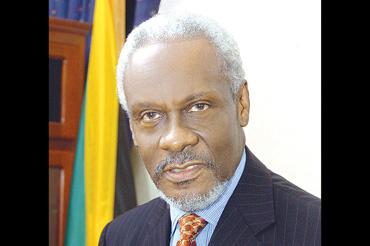The sixth Prime Minister of Jamaica, former politician, Percival Noel James Patterson, born on the 10th of April 1935 who served the country from 1992 to 2006, former leader of the People’s National Party.
He attended the Calabar High School, before moving on to pursue higher studies at the University of the West Indies Mona Campus, and later the London School of Economics.
His time as a Law student at the London School of Economics consolidated the foundation in international politics that his university experience in Jamaica had provided.
After graduating from the UWI he joined the PNP’s organising staff in 1958. His early training and service were in St. Thomas, St. Catherine, St. Elizabeth, Manchester and Westmoreland.
He held office as Prime Minister after Michael Manley retired in 1992, at a time when the Caribbean island nation was facing the formidable challenge of securing a place in a new global order of economic liberalization and deregulation.
He was elected the youngest ever Vice President of the People’s National Party later that year at age 33. Patterson was elected the Member of Parliament for Westmoreland South Eastern in the constituency’s by-election of 1970.
The constituency borders were reorganized prior to the general election of 1993 and he was elected as the Member of Parliament for Westmoreland Eastern in that election, a seat he held until his retirement in 2006.
PJ Patterson’s interest in politics and international relations began as a student, when he served as Chairman of the University of the West Indies External Affairs Commission, during which period he gained exposure to world leaders and international political thought through attendance at a number of international student fora.
In one of his final initiatives as Prime Minister, PJ Patterson launched a program of radical transformation of the island’s education system aimed at the development of quality human capital equipped to succeed in the competitive global economy. His style of leadership is not to rely on fiery speech-making, but on fundamental principles of procedure.

He has done more than any other political leader to date, to empower his associates and to structure a party committed negotiate peace and settle differences through a reconciling process rather than confrontation.
He since served as Deputy Prime Minister and Minister of Foreign Affairs and Foreign Trade (1978-80), Deputy Prime Minister and Minister of Development Planning and Production (1989-90).
P. J. Patterson is the first prime minister of Jamaica to have been born of two black parents. Implementing the free-market reforms that swept the region and much of the Third World during the 1990s, he proved to be a skilful and steady chief executive, bringing new prosperity to an island nation that, despite its well-known tourist industry, has suffered considerable economic difficulties since gaining independence in 1962.
Patterson resigned from his posts in a 1991 scandal involving the improper granting of tax relief to the multinational Shell Oil Company. But the allegations did little damage politically, and when Manley announced his resignation due to ill health on March 15, 1992, Patterson was widely viewed as a strong candidate to succeed him.